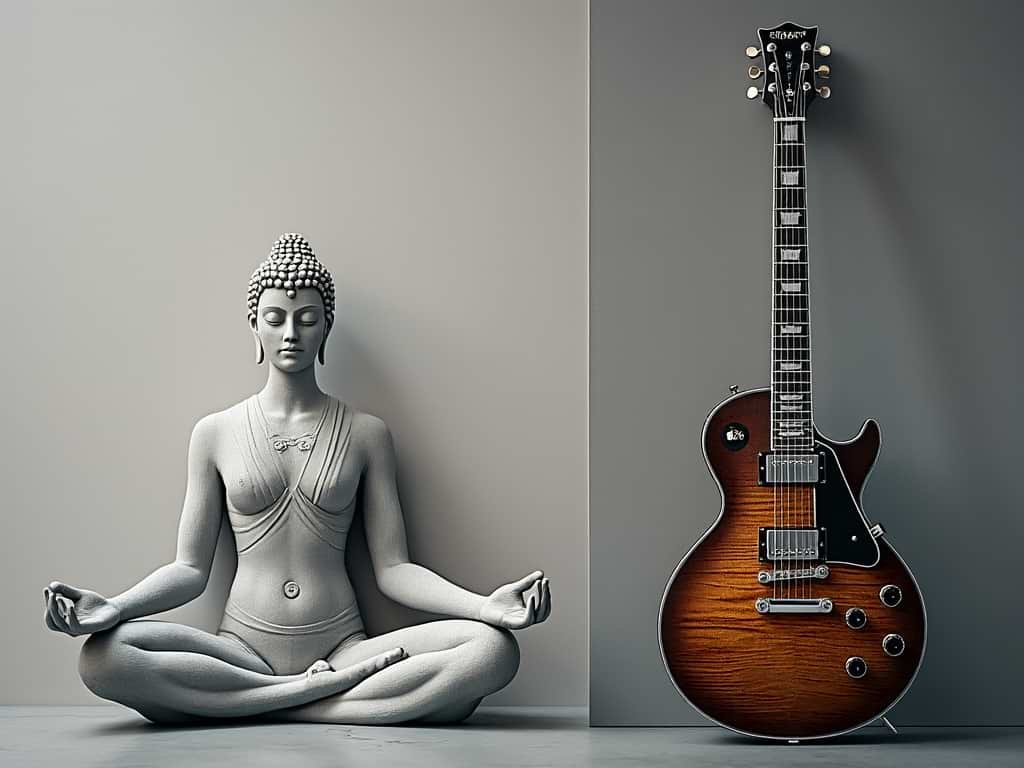Prepare to challenge your assumptions about spirituality, consciousness, and heavy metal. When most people think of reaching enlightenment, they picture silent meditation and gentle music—but what if the path to ego dissolution could be found in thundering guitar riffs and mosh pits? Drawing parallels between Zen awareness and the raw catharsis of metal music, this exploration reveals how even the most intense experiences can lead us to profound truth. Discover why neuroscience’s material explanations of consciousness fall short, and how losing yourself in the beautiful chaos of a metal concert might just bring you closer to authentic nondual realization than any meditation cushion.
Table of contents
The Zen of metal music: crowd surfing the waves of raw emotion
When considering the science of feelings, we often end up talking about neuroscience and the role of dopamine, serotonin, antidepressants, and the like. Dualism means that the objective brain produces subjective states—a powerful model to conceive the mind. Deepening our understanding of the “brain reality” at the molecular level has improved many people’s lives. But how does it relate to Zen? Zen is a nondual mood, when you forget your ego. Let me illustrate this with music: four minutes of AI-created thrash metal. You may not like the genre, but not unlike koans, power riffs can transport you to your essence.
The success of dualistic neuroscience is like a Trojan Horse: It slips a false assumption into our beliefs. It suggests that the submicroscopic world of neurotransmitters is more real than private subjective experiences. Unlike dualism, rational nondualism acknowledges that the distinction between the subjective and objective is an illusion. Neuroscience investigates vital facts about the brain, but that doesn’t make the material brain substances a mind-independent reality. What’s real is what’s felt—immediately and undeniably. And what’s felt is what this post is all about: the Zen of metal music, a roar of raw emotion that can serve as a gateway to the present: that place where you forget yourself.
My take on nonduality is rooted in a world-shattering experience of direct insight, which my mind allowed to happen because it had rid itself of many irrational beliefs. Hence my focus on rationality in a Western nondualism conversation that is typically suspicious of thinking. My Zen may also be louder than what you’re used to. But consider this: Zen involves total acceptance of the world, just as it is. And, fortunately, our world is full of energy and passion!
When bitter tastes good
“Metal music is like dry red wine,” a friend once told me, his eyes gleaming with the passion of a true aficionado. “There’s nothing better. You may listen to all kinds of other music, but in the end, you always return to metal.” This analogy struck a chord with me, resonating despite its apparent contradictions. After all, sipping a fine Cabernet at a metal concert would be as out of place as headbanging at a wine tasting.

Yet, the comparison holds a profound truth. Both dry red wine and metal music are acquired tastes, demanding patience and an open mind from the uninitiated. They challenge the senses, pushing beyond the comfortable and familiar. But once you’ve truly experienced their depth–the complex tannins of a bold Bourgogne or the intricate layers of a progressive metal opus–you’re irrevocably transformed. The saccharine simplicity of pop ballads or sugary cocktails suddenly feels hollow in comparison.
Portal to primordial truth
Metal, in its myriad forms, is indeed hard and often bitter–a sonic sledgehammer that pounds at the gates of our perception. It’s a genre that doesn’t shy away from the darker aspects of existence, serving as a portal to primordial truths that lurk beneath the veneer of polite society. Is it a manifestation of Jung’s concept of the Shadow, that repository of repressed impulses and taboo desires? Perhaps. I write about it in Existential Rationalism and Without Opposite. But such musings pale in comparison to the visceral experience of a live metal show.
For metal isn’t just about darkness or aggression. At its core, it’s one of the most profound celebrations of being alive. It’s a Testament, if you’ll pardon the pun, to human creativity, technical prowess, and emotion pure. From the blistering speed of thrash to the atmospheric soundscapes of black metal, from the crushing weight of doom to the mind-bending intricacies of progressive metal–each subgenre offers its unique chemistry of sound and fury.
Timeless riffs
And what about us, the graying guardians of the genre? You’ll find us at the back of the concert hall, a cold beer in hand and earplugs discreetly tucked in (because while our passion hasn’t dimmed, our eardrums aren’t what they used to be). We stand there, nodding our heads in time with the double bass drums, lost in nostalgic reverie or simply awestruck by the sheer epic scale of those timeless riffs.
As the night wears on and the ales make their way into our systems, some of us might feel the call of the mosh pit. It’s a siren song we know we should resist–our backs aren’t as forgiving as they once were, and work tomorrow won’t wait for us to recover. But the metal gods are demanding, and who are we to deny their call?
Catharsis in the maelstrom
So we wade in, grinning like fools, swept up in a maelstrom of bodies and beats. For those few moments, age melts away. We’re teenagers again, invincible and alive, united by the thunderous rhythms and soaring melodies that have been the soundtrack to our lives.
To the uninitiated, it might seem chaotic, even frightening. But those who know understand that beneath the surface aggression lies a code of honor and camaraderie. We look out for each other in the pit, helping fallen comrades to their feet, sharing in the collective catharsis that only metal can provide.
As the final notes fade and we stumble out into the night, ears ringing and bodies aching, we’re reminded of why we keep coming back. Metal isn’t just music–it’s a lifestyle, a community, a way of facing the world head-on with unflinching honesty and unwavering strength.

A confession
So here’s to metal, in all its ground-shaking, ear-splitting glory. May its riffs forever reign, its solos always soar, and its spirit never die. And to the younger generation discovering the power of this incredible genre: Respect your elders. We may be a bit worse for wear, but we’ve been keeping the faith since before you were born. The torch is yours now–carry it high, and let the metal mood guide you through the highs and lows of life.
Okay … this patriarchal paragraph calls for a confession: Metal music is but one of many genres I love. I’m a fan but hardly a true metalhead. My taste oscillates between metal, Latin-American music, and, erm, opera. Yet, metal music so beautifully drives home crucial nonduality insights, such as that there are more ways to achieve nondual realization than silent meditation. And that nondual realization should not be confused with mere virtuous serenity. Nondual recognition often leads to calm and happiness, but that’s not the heart of the matter.
Virtue and peace of mind aren’t nondual-awareness goals because any goal splits the mind into subject and object—a duality. The idea that this awareness automatically makes one behave like a pacifistic saint, with a taste for ethereal and classical music only, is just wrong. I often find spiritual seekers insisting on stoic calm, “happy-positivity,” and tolerance no matter what because they think nonduality demands it.
They often subscribe to a “nonduality-light” and consider our stoically compassionate Western values, rooted in two thousand years of Christianity, secular and “objective” neuroscientific facts to which the whole world would undoubtedly subscribe “if only they had our standard of living and were better educated.” So what’s wrong with this argument, besides being horribly condescending? It’s dualistic! Objective ethical facts are a dualistic fallacy. Sanity: Humanism is a Dualism gives a more thoughtful diagnosis of failed Western ethical reasoning and its dire consequences—with a wink to Jean-Paul Sartre’s Existentialism Is a Humanism.
If you want to know more about “gentle” versus “radical” nonduality, I recommend an article by Luka Bönisch: “In the end, we can say that the gentle non-duality is either (radical) non-duality misunderstood or watered down to make it less offensive to the ego,” as he so eloquently puts it. Objectively ethical behavior is a fallacy. The good news is that we can unlock intuition by embracing this fact. Not concepts but feelings determine ethics, and our feelings are more reliable when rooted in rational beliefs. Nondual realization is a leap of faith, a trust in our being that we’ll do the right thing when the occasion arises without demanding it.
Effortless expression
The nondual view simply recognizes what is, without prescribing specific behaviors or ethical standards. Yet, paradoxically, as individuals deepen their understanding and experience of nonduality, they often find themselves naturally inclined toward more compassionate and altruistic actions. This shift occurs not because nondualism mandates kindness, but because the recognition of fundamental interconnectedness tends to dissolve the ego-driven motivations that often lead to selfish behavior. When one truly grasps that harming others is, in essence, harming oneself and that helping others is helping oneself, altruism becomes less a moral choice and more a natural expression of one’s deepest understanding of reality.
This spontaneous movement toward altruism can be likened to a river flowing to the ocean. The river doesn’t choose to flow downhill; it simply follows the path of least resistance by its nature. Similarly, as the illusion of separateness dissolves in the light of nondual recognition, actions that benefit the whole naturally arise, not from a sense of duty or moral obligation, but as an effortless expression of one’s true nature.
The beauty of nondual recognition lies in its constant availability as a source of guidance. That’s what gives the inner peace. Unlike rigid moral codes or ethical systems that require constant interpretation and application, nondual recognition offers a direct and immediate perspective on any situation. By returning to this awareness, individuals can tap into a wellspring of wisdom that provides empathy, assertiveness, and an inclusive perspective. This doesn’t mean that every decision becomes easy, but rather that there’s always a path to clarity.
Concepts are not reality
Once nonduality is realized, the nondual guidance of the moment is never more than a breath away. There are other ways to forget your ego, too, at least temporarily: meditation, prayer, music, dance, sport, art—your heartfelt path is always right. Zen means being at peace with the all-encompassing present truth, whether by spiritual practice or being swept away by rapid guitars. Thus in touch with your core, there is no doubt that subjective states are more real than the material world since they are your being and guidance at once. The Zen of metal music teaches that the neuroscience of feelings studies crucial facts but not reality. Neurotransmitters are concepts, nothing more and nothing less.
Now, if you’ll excuse me, I have a playlist and a vintage bottle of Chasse-Spleen to attend to. It’s time to raise a glass to the gods of metal and lose myself in the beautiful chaos once more.
You can support Marcel’s work , find gifts, and amp up your style at Marcel’s Booktique.
His books—in paper, pixel, and audio—can also be found at Amazon and other select retailers.
Looking for mindful & funny spiritual gifts, gear, deco, or gadgets? Why not check out the affordable Amazon Merch custom designs by Simply Nondual!
Share this article:




